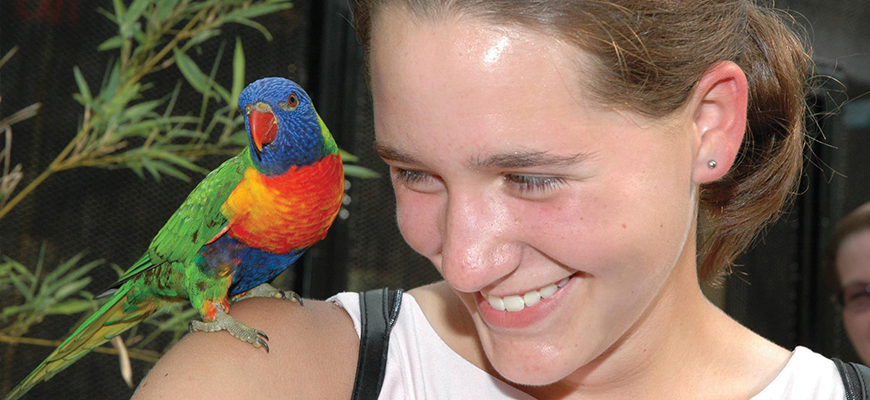Lorikeets are on exhibit when the temperature is 50 to 100 degrees.
Hours may vary depending on staffing and attendance. All activities are seasonal and subject to regular Zoo maintenance and the cooperation of weather and animals.
Amazement, wonder and delight are exactly what you’ll experience when you visit one of our most interactive and popular exhibits, Lorikeet Landing at Rainbow Springs.
Lorikeet Feeding
Enjoy a real nose-to-beak experience as you stroll through this beautiful aviary surrounded by brilliantly colored, friendly birds that will eat nectar right out of your hand! Nectar may be purchased at the exhibit.
Lorikeet Feeding Prices
| Non-Members (per cup of nectar) | $3 |
|---|---|
| Members (per cup of nectar) | $2 |
Lorikeet Schedule
Lorikeet Landing will be open daily when the temperature is 50° or above unless we are experiencing thunderstorms.
Lorikeet Facts
We thought you might like to know a bit about these colorful and gregarious birds before you meet them.
- Range: Tropical islands and nations such as Indonesia, Polynesia, Australia and Papua New Guinea.
- Habitat: Most live in the canopy of dense rainforests or at the edge of wooded areas near open savannahs. Some live in mountainous regions.
- Diet: Wild: nectar, pollen, fruits and flowers. Zoo: Nectar mix (in powder form and then mixed with water), a lot of fruit, some vegetables, sometimes cooked brown rice and meal worms.
Behavior
- They sometimes sleep on their backs with their feet straight up in the air.
- They must bathe frequently in order to properly maintain their plumage.
- Most Lories can and will talk if trained.
- Lories will hang upside down for hours at a time.
Status
At least 13 species are endangered or vulnerable, particularly those found only on small islands. Causes of endangerment include habitat destruction for logging and agriculture, introduction of exotic species such as rats, domestic cats and dogs, mongoose and mosquitoes, accidental introduction of exotic diseases, such as avian malaria, and trapping for pet bird trade.

